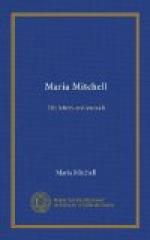I am hoping to get to Paris
next week, about the 23d. I have had
just what I wanted in England,
as to society.
“November 26. A few days ago I received a card, ’Mrs. Baden Powell, at home November 25.’ Of course I did not know if it was a tea party or a wedding reception. So I appealed to Mrs. Airy. She said, ’It is a London rout. I never went to one, but you’ll find a crowd and a good many interesting people.’
“I took a cab, and went at nine o’clock. The servant who opened the door passed me to another who showed me the cloak-room. The girl who took my shawl numbered it and gave me a ticket, as they would at a public exhibition. Then she pointed to the other end of the room, and there I saw a table with tea and coffee. I took a cup of coffee, and then the servant asked my name, yelled it up the stairs to another, and he announced it at the drawing-room door just as I entered.
“Mrs. Powell and the professor were of course standing near, and Mrs. Admiral Smyth just behind. To my delight, I met four English persons whom I knew, and also Prof. Henry B. Rogers, who is a great society man.
“People kept coming until the room was quite full. I was very glad to be introduced to Professor Stokes, who is called the best mathematician in England, and is a friend of Adams. He is very handsome—almost all Englishmen are handsome, because they look healthy; but Professor Stokes has fine black eyes and dark hair and good features. He looks very young and innocent. Stokes is connected with Cambridge, but lives in London, just as Professor Powell is connected with Oxford, but also lives in London. Several gentlemen spoke to me without a special introduction—one told me his name was Dr. Townby [Qy., Toynbie], and he was a great admirer of Emerson—the first case of the sort I have met.
“Dr. Townby is a young man not over thirty, full of enthusiasm and progress, like an American. He really seemed to me all alive, and is either a genius or crazy—the shade between is so delicate that I can’t always tell to which a person belongs! I asked him if Babbage was in the room, and he said, ‘Not yet,’ so I hoped he would come.
“He told me that a fine-looking, white-headed, good-featured old man was Roget, of the ‘Thesaurus;’ and another old man in the corner was Dr. Arnott, of the ‘Elements of Physics.’ I had supposed he was dead long ago. Afterwards I was introduced to him. He is an old man, but not much over sixty; his hair is white, but he is full of vigor, short and stout, like almost all Englishmen and Englishwomen. I have met only two women taller than myself, and most of them are very much shorter. Dr. Arnott told me he was only now finishing the ‘Elements,’ which he first published in 1827. He intends now to publish the more mathematical portions with the other volumes. He was very sociable, and I told him he had twenty years ago a great many readers in America. He said he supposed he had more there than in England, and that he believed he had made young men study science in many instances.




